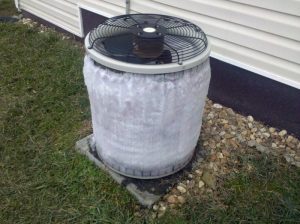…And What to Do About It!
 You likely understand at least a little about how your air conditioner works. There is a fluid called refrigerant inside of it that absorbs heat to transfer it from your home to the outdoors while putting the air through a process that cools it and sends it back into your home. The hot air from your home is released from the condenser unit–the outside unit–of your air conditioner as the AC runs.
You likely understand at least a little about how your air conditioner works. There is a fluid called refrigerant inside of it that absorbs heat to transfer it from your home to the outdoors while putting the air through a process that cools it and sends it back into your home. The hot air from your home is released from the condenser unit–the outside unit–of your air conditioner as the AC runs.
What your air conditioner doesn’t use or need though, is ice. It’s easy to assume that ice would be involved since your air conditioner provides chilled air to your living space. But moving heat from one area to another shouldn’t involve any ice development at all, and yet…
Ice Has Formed On Your AC
When this happens, the first thing you should avoid is trying to remove the ice on your own. The ice is there for a reason (which we’re about to get to) and our pros need to get to the root cause and solve it before the ice can be thawed and removed. Otherwise, you could do further damage unintentionally, while doing nothing to help avoid the development of ice in the future. So, why does this occur?
- It’s humid outside. A standard central air conditioner does have some dehumidification properties–it draws in hot air but also humid air from your home. When that humid air moves over the cool indoor evaporator coil, condensation forms, and if the coil is too cold, the moisture can freeze.
- There is dirt and grime on the coils. Any debris that settles on the evaporator or condenser coil creates an insulating layer. This means in the case of the evaporator coil, it can no longer absorb heat. As a result, the coil freezes over.
- Your air filter is clogged. The air filter that comes standard with your HVAC system is in place to protect the inside components from the above-mentioned debris. If it gets too clogged, airflow is restricted and the lack of warm air can lead to the evaporator coil freezing over.
- You have a refrigerant leak. If there isn’t enough refrigerant moving through your system, there won’t be enough to draw in enough heat from your home. The remaining refrigerant will be too cold and ice will form.
“What Can I Do About It?”
If the ice is already present, then the best thing you can do is to call our staff. If you’re looking to avoid this problem altogether, the best thing you can do is call our staff still, but to schedule routine maintenance! During maintenance, we’ll thoroughly inspect, clean, and adjust your system to make sure it’s in good shape so you don’t run into this problem.
It’s also important that you do one small maintenance task on your own–change your air filter every 1-3 months during periods of system use. This will help you avoid ice development and a whole host of other operational problems.
Contact our team at the first sign that you need professional Joliet AC service! Comfort First Heating and Cooling, Inc., where we put your comfort first.
